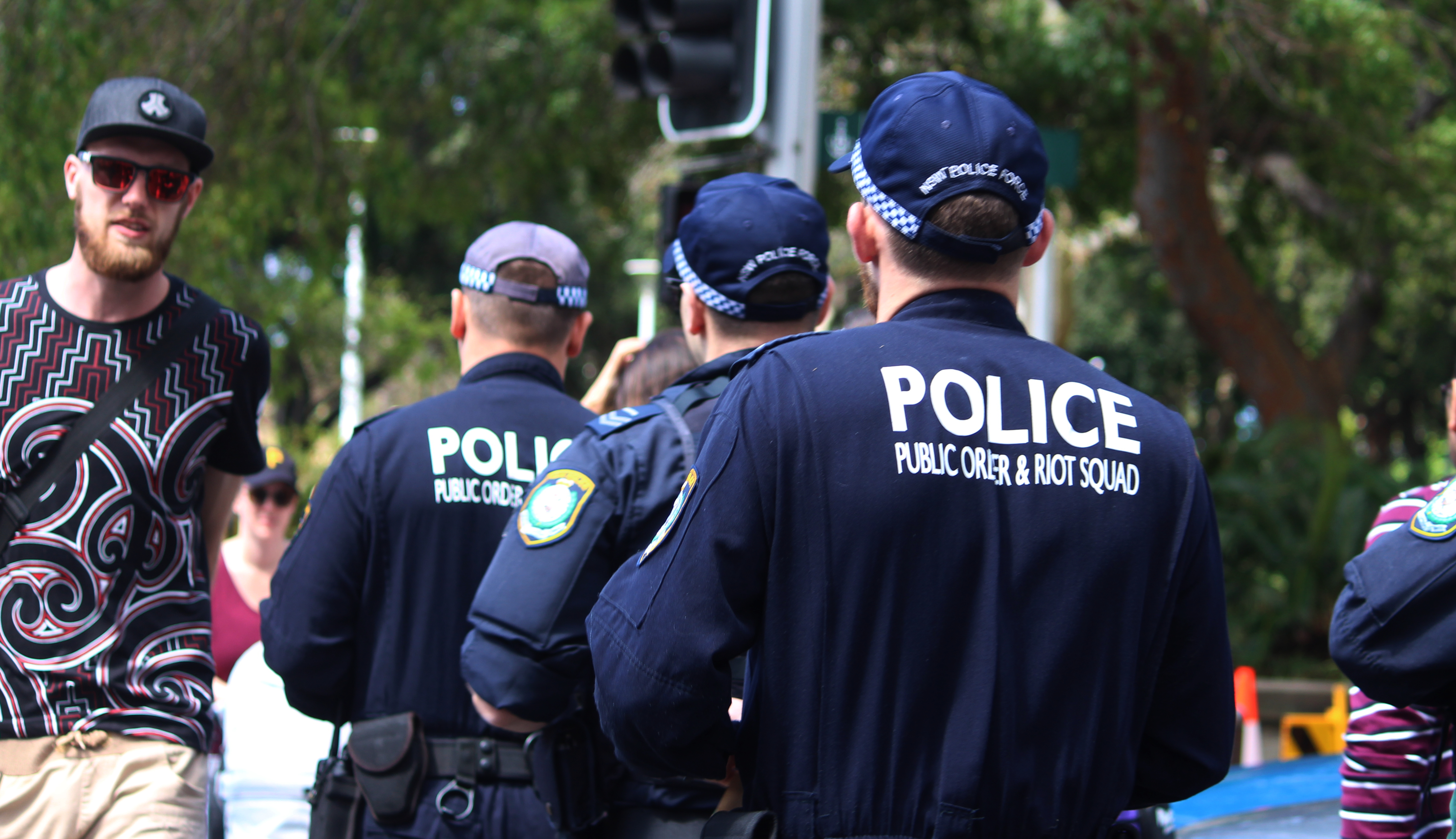Share This Article
By Sahar Adatia and Jimmy Singh.
Whether you agree with it or not, when it comes to enforcing the law, police are considered the gatekeepers and guardians of the system, ensuring they both protect and control citizens.
For the most part, when performing their duties, police officers are rational and reasonable in exercising their power, expecting the same level of respect from members of the public in return.
Nevertheless, in some circumstances, citizens have a tendency to react to police with excessive force and even offensive language in order to defend themselves, often leading to an escalated situation that spirals into hostile and aggressive behaviour towards authorities.
One such case that made headlines significantly across news outlets this year involved four people who erupted into a wild brawl outside a Sydney nightclub that eventually sent five police officers to hospital with severe injuries.
The injuries included a broken nose, a fractured elbow and even a dislocated jaw.
How the Incident at the Potts Point Nightclub Unfolded
At about 11:20pm on 20 October 2019, a man and woman who spent the night at the ritzy Potts Point nightclub, Flamingo Lounge, declined a request from security guards to leave the venue.
As police stepped in to assist the security guards at the club, the pair suddenly turned on them, at which point a brawl broke out.
The duo assaulted the police officers, following which another four people from their group entered the scuffle.
The group then continued to throw punches and hurled police to the ground.
The fight left the police officers severely injured, which included a male sergeant with a fractured elbow and torn tricep, a male constable with a dislocated jaw, and a second male constable with a broken nose and abrasion to his left eye retina.
Meanwhile, two male probationary constables suffered head injuries and a female probationary constable also bore swelling to her cheek.
Police Turn to Riot Squad to Break Up Brawl
With the brawl getting out of hand, police were forced to call the Riot Squad and use pepper spray to break up the fight.
Five officers were taken to hospital with injuries, while paramedics underwent treatment on several people at the Potts Point scene for the effects of pepper spray.
In total, six people were arrested and taken into custody at Kings Cross Police Station and Sydney City Police Station, with four charged and refused bail.
A 34-year-old man was charged with assaulting police officers in execution of duty; affray; causing grievous bodily harm to a police officer on duty; and resisting an officer in execution of duty.
A 22-year-old woman was charged with assaulting police officers in execution of duty; affray; and destroying or damaging property.
Additionally, a 24-year-old woman was charged with affray; assaulting a police officer in execution of duty; resisting an officer in execution of duty; wilfully obstructing an officer in execution of duty; and being an excluded person who remained in the vicinity of a licensed premises.
Finally, a 25-year-old man was charged with affray and possessing a prohibited drug.
Superintendent Paul Callaghan: Abuse Against Police “Not Tolerated Under Any Circumstances”
Speaking to reporters the following day, Superintendent Paul Callaghan from the Kings Cross Area Commandexpressed his disgust at the abuse received by the police officers who stepped into the brawl.
“It’s atrocious, completely disgusting. It’s not acceptable,” Superintendent Callaghan said.
“Police are not punching bags. Abuse against police will not be tolerated.
“I warn anybody who commits offences towards police that they will be dealt with.”
Superintendent Callaghan also praised his officers, saying despite suffering wounds they continued to intervene to stop the brawl and protect the community.
“Human nature, you have that fight or flight response. These guys have that fight response. They protect the community,” he said.
Superintendent Callaghan said his officers would be greatly impacted due to the injuries faced.
Law on Assault Police Charges in NSW
In NSW, assaulting a police officer who is acting the execution of duty is against the law and is a matter that is taken extremely seriously.
The law states that it is a criminal offence to assault, throw a missile at, stalk, harass or intimidate a police officer in NSW while the officer is carrying out his/her work as a police officer.
Assaulting includes any conduct that causes either fear or injury to the officer provided there was that intention to cause this at the time. This can include physical contact or non-physical contact.
This includes behaviour such as touching them without their permission in a manner that causes them to fear for their personal safety and making threats towards them.
It is common for this kind of conduct to take place more frequently where a person is being arrested or where he/she feels threatened.
Click here to for an outline on what stalking and intimidation means under the law in NSW.
Acting in the execution of duty here basically means that the officer was acting lawfully within his powers under the law as a police officer. An example of police not acting lawfully can include when he/she makes an illegal arrest or illegal search.
If a police officer acts illegally, the charge can get dismissed in court or dropped earlier in the case through negotiations. In some cases, the prosecution may end up paying the defence legal fees.
For tailored advice, it’s strongly recommended to call our assault lawyer office.
What are the Penalties in NSW?
In NSW, it is an offence to assault a police officer and the penalties are harsh to reflect to the community that the courts will not hesitate to treat assaults on police severely, particularly as officers face extremely difficult situations.
As such, it is not uncommon to hear of even minimal contact with a police officer resulting in a person getting charged for assaulting police.
In NSW, the law on assaulting a police officer in their execution of duty is outlined in section 60 Crimes Act 1900 (NSW).
The consequences vary depending on the circumstances of the assault – that is, whether it occurred as part of a public disorder and extent of the officer’s injury.
The below are an outline of the penalties for assaulting a police officer in NSW:
- 5-years imprisonment for assaulting, harassing, stalking, intimidating or throwing a missile at a police officer if the injury to the officer does not cause actual bodily harm. Actual bodily harm includes scratch or bruise to the body.
- 7-years imprisonment where the above occurs in a situation of a public disorder.
- 7-years imprisonment for assaulting a police officer where the assault causes the officer actual bodily harm. This offence also has a standard non-parole period of 3-years attached to it.
- 9-years imprisonment where the above (3) occurs in a situation of public disorder.
- 12-years imprisonment with a standard non-parole period of 5-years imprisonment for assaulting a police officer causing a wound or grievous bodily harm to the officer. Grievous bodily harm includes a broken bone. A wound includes a cut to the interior layer of skin.
- 14-years imprisonment where the above (5) occurs in a situation of public disorder.
Note that these penalties apply even if the police officer was off duty at the time, as long as the officer was acting lawfully in the execution of his/her duty as a police officer. (section 60(4)).
Before a person charged of this offence can be found guilty, the prosecution must first prove each of the following elements beyond reasonable doubt:
- The accused assaulted, stalked harassed, intimidated or threw a missile at a police officer, causing either no actual bodily har, actual bodily harm, wound or grievous bodily harm to the officer; and
- The accused person intended to cause this, or in the case of where grievous bodily harm was caused- he/she was aware that his/her actions would possibly cause actual bodily harm (even though it ended up causing grievous bodily harm); and
- The police officer was acting lawfully in the execution of his/her duty as a police officer.
Click here for an outline on defences to an assault police charge in NSW.
Have a question on this topic? Contact our friendly team 24/7 (02) 8606 2218 to arrange a consultation with one of our experienced criminal lawyers based in Parramatta and Sydney city.
Assault charges carry heavy penalties.









